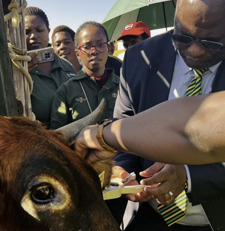
Eastern Cape Premier Oscar Mabuyane has stated that the widespread stock theft in the province has led government to introduce a technology-based system to help combat the scourge.
This crime has been causing emerging rural farmers to lose millions of rands.
Mabuyane made these comments during the launch of the Livestock Identification and Traceability System (LITS) in Tsolo on Tuesday.
The Premier was joined by the Rural Development and Agrarian Reform (DRDAR) MEC Nonkqubela Pieters and Transport, Community Safety and Liaison MEC, Xolile Nqatha.
LITS is a technology-based ear tag device that the government is distributing to 120 cattle farming enterprises, benefiting 30 000 cattle across the province.
Mabuyane reported that more than 18 000 animals, valued at over R58 million, have been stolen in the province recently.
“You can imagine what that is doing to the economy. When you talk about the province being the home of livestock, you are talking about subsistence rural farmers. We have a problem of livestock theft, and it has been with us for some time now. We are trying to tackle that,” Mabuyane said.
He believes the electronic ear tag device will also ensure that animals are not only branded but their origins would be traced.
“We are trying to introduce a more organised and commercial way of handling these animals. This is part of us trying to fight and curb livestock theft. We are sending a message to all the thieves out there that we will go after you in a better and more organised manner. You cannot sleep today and wake up with a kraal full of cows that you can’t account for,” he stressed, adding that the system will be rolled out across the province.
The Premier stated that government wants to see all animal populations being branded properly and given the ear tag to make sure they are monitored better.
Pieters said LITS will assist farmers in Tsolo, which is one of the municipalities with a high rate of stock theft and assist the police to identify the rightful owner of the cattle.
“Even if you sell the animal to somebody else, you will be able to trace the origin. If there are diseases, you can trace the origin of the cow. Farmers are going to be trained to keep records of their cattle to make sure that if it was sick, when was it sick, what type of medication has been used, how many times have you dipped your herd of cattle,” Pieters explained.
Nqatha said the launch adds the instruments needed in the fight against crime and government will ensure that all those who are responsible are held accountable.
Arrests
“Already we have been able to recover the stolen livestock, we have already been able to effect arrests. One of the things we were able to do was to assess our stock theft unit and its location between Qumbu and Sulenkama so that the capacity of the police is located nearer to the hotspot to facilitate our responsiveness,” said Nqatha.
According to the MEC, the community should work with the police to fight against stock theft, adding that animal branding and ear tagging will assist in this collaboration.
One of the farmers whose animals were ear-tagged and branded, Sabatha Mnjunju said he hoped the system would be able to track livestock and they would be easily identified when stolen.
Another farmer, Mzimeli Yelo, who even though was sceptical about the LITS, welcomed the system.
“It will help us but the chances of it helping are small because ear tags can be removed. Thieves know how to remove them. But where I think it can help is if you lose animals today when they had not succeeded in removing the tags and you report it on time, it can help trace the animals that way,” said Yelo.
Collaboration and training
According to the province, all the ear-tagged animals and the identities of their owners are registered into a central database where animal movement is recorded to make it easy to trace the animal back to the owner.
DRDAR is implementing this national policy through collaboration with the Agricultural Research Council (ARC).
Currently, the department trained and registered more than 250 veterinarians, scientists, animal health technicians and extension advisors to lead the implementation of the system. – SAnews.gov.za


